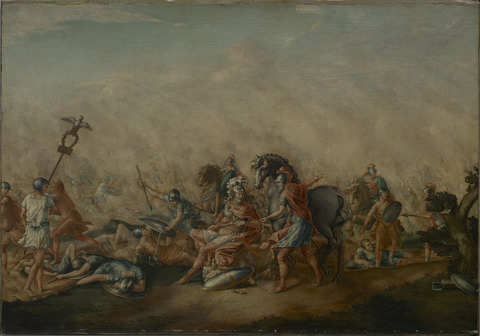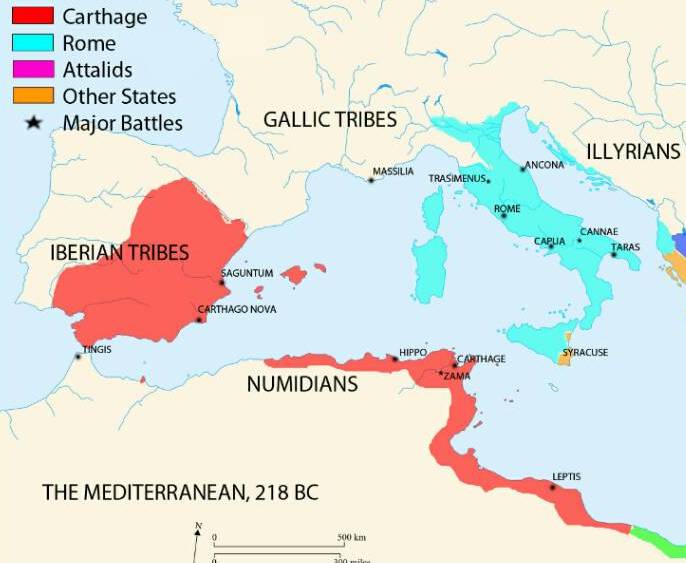by Michael Walsh
In the following excerpt from his book Last Stands, author Michael Walsh discusses the rising dominance of the Roman military and the shocking outcome of the Battle of Cannae that left historians wondering: how could the best-outfitted and best-trained army of the ancient world have been routed in such a way?
CANNAE (216 B.C.)

Yale University Art Gallery.
Spartan, and indeed Greek, military supremacy did not last long. Across the Ionian Sea, another superpower soon arose, once that had, according to its foundational myth, sprung itself from the ruins of Greece’s mortal enemy, Troy. Whether merely poetic or historical, the triumph of the defeated Trojans was born in the ashes of Ilium, whose “topless towers” had fallen to the subterfuge of wily Odysseus and the wooden horse whose pregnant belly had disgorged the Achean troops who rampaged through the city, avenging the wronged honor of the Peloponnesians of Mycenae.
Plus ça change: the Macedonian military genius, Alexander, had transformed the Spartan infantry into an irresistible threshing machine that had chewed its way across Asia Minor and finally had crushed the Persians at the battle of Gaugamela in 331 B.C., permanently ending the Aryan threat to the West. But Alexander’s vast empire had essentially died with him in Babylon in 323 B.C., to be split among his generals—one (Ptolemy) in Egypt and, eventually, the Byzantines at Constantinople: the expansionist, syncretic Romans quickly enough learned military tactics from their former antagonists, transforming the phalanxes of their enemies into the far more flexible and lethal legions who were able to confront the Macedonians at Cynoscephalae in 197 B.C. and defeat them on their home turf; exposing the weakness of the phalanxes on rough terrain by flanking and then enveloping them from the rear.
Still, the Greeks’ lasting influence came at Rome, their bastard offspring and greatest successors. Without the Greeks, there is no Rome—no philosophy, no learning, no drama, no architecture, no sculpture, no literature. Countries—civilizations—are not simply the sum total of their military conquests or their judicial systems (countries can exists without lawyers; lawyers cannot exist without countries), but are, at root, the essence of their people. Rome would not have existed without Greece, from whom it took wholesale its legends and its gods. Without Greece, there is no Rome. Without Rome, there is no West. And without the military traditions of either, there is only barbarism. Force of arms, and the willingness to use them, is the sword and shield of Western civilization. Arma virumque cano1—“I sing of arms and the man”—are the most potent words in the history of pre-Christian Western civilization, rooting our society squarely in the history of untrammeled masculine bellicosity.
And yet not even the Romans, who forged a civilization out of ruthless discipline in the face of opponents of far greater physical size but less discipline and determination, almost always won. Except when they didn’t. And even then, they did—for reasons that might at first blush seem nonmilitary but were profoundly sexual and cultural.
From the beginning of Rome, from the time of the “rape” of the Sabines in the eighth century B.C. (in which the Romans exchanged sexual access to the Sabine women for peace with their menfolk, and thus incorporation into the nascent Republic), Rome relied on the fertility of its women to supply the warriors of the future. This fecundity enabled the Romans to resupply the ranks of their military almost at will; martial sexual potency played as important a role in the creation of “armed men” as did the boudoirs of peacetime. And, at pivotal moments in the history of the Republic, it proved to be decisive—even (or perhaps especially) when the Romans suffered a crushing defeat.
The Battle of Cannae, fought on a hot August day in 216 B.C. on an Apulian plain near the Adriatic coast southeast of Rome, was one of the greatest disasters in military history. Never had Republican Rome fielded an army of such size, nor would it; neither would Imperial Rome. Never again would it suffer such an epic disaster. In all, more than 55,000 (some estimates run as high as 70,000) legionaries went to their deaths in a battle against Hannibal Barca and his invading but outnumbered army of Carthaginians, Numidians, and Celtiberian and Gallic mercenaries; by the time the slaughter had ended, the cream of Roman society, including consuls, senators, equestrians, and commanders, lay dead, and Rome herself lay open to invasion and conquest.

This image is in the public domain via Wikicommons.
The engagement was the centerpiece of the Second Punic War, a struggle for supremacy in the Mediterranean basin between the Romans and the Carthaginians, descendants of the seafaring Phoenicians2 who had moved beyond the eastern Mediterranean to establish colonies in Sicily, North Africa, Spain, and elsewhere. Talk about a clash of civilizations: between Rome and Carthage, there could be only one winner. The Romans, whose armies were largely Roman, worshipped their multiple gods, who derived largely from the Greeks; the Semitic Phoenicians principally worshipped the fertility god, Baal, practiced child sacrifice, and generally preferred mercenaries under Carthaginian command to fight their wars.
Cannae wasn’t just a rout, for a rout might imply that many of the Romans fled and escaped. Rather, it was a slaughter, an abattoir, as the legions, pressing forward as was their wont, were sucked into a trap, attacked on both flanks, and finally surrounded and killed to nearly the last man. Think of Cannae—warfare’s textbook example of a double envelopment—as the panic of a very large crowd that suddenly finds itself hemmed in on all sides and, in its frenzy to escape, begins trampling itself. At the end, the exhausted Romans, penned in and unable to fight or even move, simply consigned their spirits to the gods and went under African swords—or their own. If ever there was a time when the fall of the axe was welcome, Cannae was surely it.
How could this have happened? How could the best-outfitted and best-trained army of the ancient world have come to such a pass? And how and why did Rome recover and not only go on to win the Second Punic War but also to utterly destroy Carthage in the Third?
1 The opening lines of Virgil’s Aeneid.
2 And thus the Carthaginians.

The author of more than fifteen novels and non-fiction books, Michael Walsh was the classical music critic for Time Magazine and received the 2004 American Book Awards prize for fiction for his gangster novel, And All the Saints in 2004. His popular columns for National Review written under the pseudonym David Kahane were developed into the book, Rules for Radical Conservatives. His books The Devil’s Pleasure Palace and The Fiery Angel, examine the enemies, heroes, triumphs and struggles of Western Civilization from the ancient past to the present time. He divides his time between Connecticut and Ireland.
